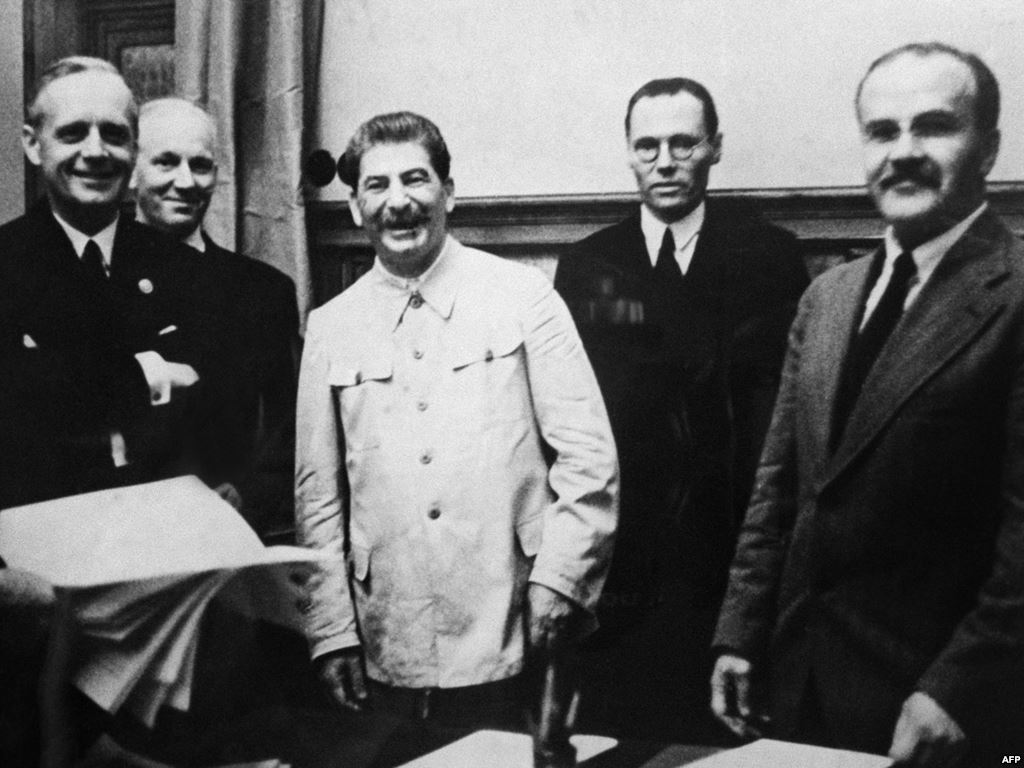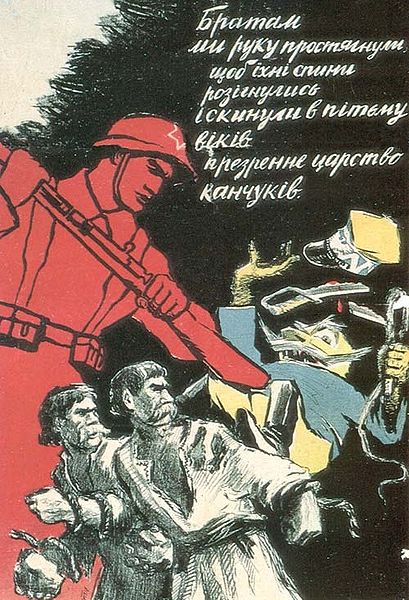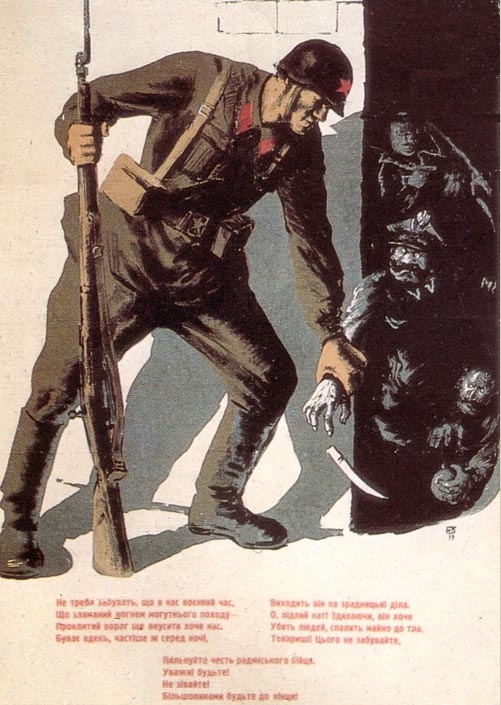Seventy-five years have passed since the Red Army invaded Poland on September 17, 1939. This unprovoked attack was Stalin’s way of fulfilling his alliance with Hitler, codified in the Molotov-Ribbentrop Pact. The Soviet Union made no declaration of war and rationalized its assault as a way to stabilize and liberate eastern Poland (now parts of modern-day Ukraine, Belarus and Lithuania) after the chaos caused by the Nazi invasion from the west and north, which started on September 1.
 Joachim von Ribbentrop, foreign minister of Nazi Germany (far left), Joseph Stalin, dictator of Russia (center) and Vyacheslav Molotov, foreign minister of the Soviet Union (far right) in Moscow, August 23, 1939
The Soviet attack had devastating consequences for Poland, whose situation was already desperate. The Red Army advance could not be countered, because most of Poland’s forces had been shifted to the west to face the Nazis. The Polish military’s strategy to fight against Germany, while consolidating its forces in the south-east of the country while waiting for the British and French to join the fight, became impossible. The heroic resistance of the Border Protection Corps and a small number of cavalry couldn’t hope to stifle the advance of hundreds of thousands of communist troops, supported by tanks and artillery.
Joachim von Ribbentrop, foreign minister of Nazi Germany (far left), Joseph Stalin, dictator of Russia (center) and Vyacheslav Molotov, foreign minister of the Soviet Union (far right) in Moscow, August 23, 1939
The Soviet attack had devastating consequences for Poland, whose situation was already desperate. The Red Army advance could not be countered, because most of Poland’s forces had been shifted to the west to face the Nazis. The Polish military’s strategy to fight against Germany, while consolidating its forces in the south-east of the country while waiting for the British and French to join the fight, became impossible. The heroic resistance of the Border Protection Corps and a small number of cavalry couldn’t hope to stifle the advance of hundreds of thousands of communist troops, supported by tanks and artillery.

 A Red Army soldier grabs the knife in the hand of an enemy dwarf in a Polish uniform, forcing the knife to drop. By Kriukov, Soviet Union, 1939, Poster collection, Hoover Archives
A persistent thorn in the sides of Polish-Russian relations has been the acknowledgment of the Red Army invasion in 1939 and contrition for the repressions, devastation and genocide perpetrated by the Soviet system. Instead there is a belligerence emanating from Moscow that is reminiscent of the imperialist ambitions of the communist era. Apparently Russian president Putin told President Poroshenko of Ukraine that he could invade and occupy five eastern european capitals within two days if he wished. A number of years ago Putin also opined that the collapse of the Soviet Union was the greatest geopolitical disaster of the 20th cenutry. Personally I think the Soviet Union’s creation was the greatest disaster of modern times.
It’s no wonder that the historical memory of the “Great Patriotic War” (the Russian name for the 1941-1945 war against Germany) is such a critical propaganda tool for the Kremlin regime. By conveniently omitting the Molotov-Ribbentrop Pact, the invasion of Poland and Finland, and millions of lives extinguished before and during the war, Russian leaders can appeal to patriotic sentiments of their citizens without sullying the memory of the achievements of their predecessors with historical truth or honest reflection on their past.
I’d like to think that western politicians and diplomats know better, but it seems that they naively believe that a lasting and peaceful solution to the Ukraine crisis can be achieved through political and economic compromises. I would argue that until Russia acknowledges the past century of her history, in the way that Germany had to reconcile itself with Nazism in its past, no peace will be lasting. A good place to start would be an acknowledgment of the tens of millions of Russians who died under the communist system. Perhaps a courageous leader will emerge one day who will do this. It’s hard to imagine that Putin, whether as a matter of pride, or pressure from powers behind the scenes, is capable of such humility.
A Red Army soldier grabs the knife in the hand of an enemy dwarf in a Polish uniform, forcing the knife to drop. By Kriukov, Soviet Union, 1939, Poster collection, Hoover Archives
A persistent thorn in the sides of Polish-Russian relations has been the acknowledgment of the Red Army invasion in 1939 and contrition for the repressions, devastation and genocide perpetrated by the Soviet system. Instead there is a belligerence emanating from Moscow that is reminiscent of the imperialist ambitions of the communist era. Apparently Russian president Putin told President Poroshenko of Ukraine that he could invade and occupy five eastern european capitals within two days if he wished. A number of years ago Putin also opined that the collapse of the Soviet Union was the greatest geopolitical disaster of the 20th cenutry. Personally I think the Soviet Union’s creation was the greatest disaster of modern times.
It’s no wonder that the historical memory of the “Great Patriotic War” (the Russian name for the 1941-1945 war against Germany) is such a critical propaganda tool for the Kremlin regime. By conveniently omitting the Molotov-Ribbentrop Pact, the invasion of Poland and Finland, and millions of lives extinguished before and during the war, Russian leaders can appeal to patriotic sentiments of their citizens without sullying the memory of the achievements of their predecessors with historical truth or honest reflection on their past.
I’d like to think that western politicians and diplomats know better, but it seems that they naively believe that a lasting and peaceful solution to the Ukraine crisis can be achieved through political and economic compromises. I would argue that until Russia acknowledges the past century of her history, in the way that Germany had to reconcile itself with Nazism in its past, no peace will be lasting. A good place to start would be an acknowledgment of the tens of millions of Russians who died under the communist system. Perhaps a courageous leader will emerge one day who will do this. It’s hard to imagine that Putin, whether as a matter of pride, or pressure from powers behind the scenes, is capable of such humility.
 Joachim von Ribbentrop, foreign minister of Nazi Germany (far left), Joseph Stalin, dictator of Russia (center) and Vyacheslav Molotov, foreign minister of the Soviet Union (far right) in Moscow, August 23, 1939
The Soviet attack had devastating consequences for Poland, whose situation was already desperate. The Red Army advance could not be countered, because most of Poland’s forces had been shifted to the west to face the Nazis. The Polish military’s strategy to fight against Germany, while consolidating its forces in the south-east of the country while waiting for the British and French to join the fight, became impossible. The heroic resistance of the Border Protection Corps and a small number of cavalry couldn’t hope to stifle the advance of hundreds of thousands of communist troops, supported by tanks and artillery.
Joachim von Ribbentrop, foreign minister of Nazi Germany (far left), Joseph Stalin, dictator of Russia (center) and Vyacheslav Molotov, foreign minister of the Soviet Union (far right) in Moscow, August 23, 1939
The Soviet attack had devastating consequences for Poland, whose situation was already desperate. The Red Army advance could not be countered, because most of Poland’s forces had been shifted to the west to face the Nazis. The Polish military’s strategy to fight against Germany, while consolidating its forces in the south-east of the country while waiting for the British and French to join the fight, became impossible. The heroic resistance of the Border Protection Corps and a small number of cavalry couldn’t hope to stifle the advance of hundreds of thousands of communist troops, supported by tanks and artillery.

“We Are Extending Our Hand to Brothers So They Can Straighten Out Their Backs and Sweep Away the Curse of the Centuries-Long Rule of the Lords” A Red Army soldier shoos a monster in a Polish military uniform away from Ukrainian peasants. Soviet Union, 1939, Poster collection, Hoover Archives
 A Red Army soldier grabs the knife in the hand of an enemy dwarf in a Polish uniform, forcing the knife to drop. By Kriukov, Soviet Union, 1939, Poster collection, Hoover Archives
A persistent thorn in the sides of Polish-Russian relations has been the acknowledgment of the Red Army invasion in 1939 and contrition for the repressions, devastation and genocide perpetrated by the Soviet system. Instead there is a belligerence emanating from Moscow that is reminiscent of the imperialist ambitions of the communist era. Apparently Russian president Putin told President Poroshenko of Ukraine that he could invade and occupy five eastern european capitals within two days if he wished. A number of years ago Putin also opined that the collapse of the Soviet Union was the greatest geopolitical disaster of the 20th cenutry. Personally I think the Soviet Union’s creation was the greatest disaster of modern times.
It’s no wonder that the historical memory of the “Great Patriotic War” (the Russian name for the 1941-1945 war against Germany) is such a critical propaganda tool for the Kremlin regime. By conveniently omitting the Molotov-Ribbentrop Pact, the invasion of Poland and Finland, and millions of lives extinguished before and during the war, Russian leaders can appeal to patriotic sentiments of their citizens without sullying the memory of the achievements of their predecessors with historical truth or honest reflection on their past.
I’d like to think that western politicians and diplomats know better, but it seems that they naively believe that a lasting and peaceful solution to the Ukraine crisis can be achieved through political and economic compromises. I would argue that until Russia acknowledges the past century of her history, in the way that Germany had to reconcile itself with Nazism in its past, no peace will be lasting. A good place to start would be an acknowledgment of the tens of millions of Russians who died under the communist system. Perhaps a courageous leader will emerge one day who will do this. It’s hard to imagine that Putin, whether as a matter of pride, or pressure from powers behind the scenes, is capable of such humility.
A Red Army soldier grabs the knife in the hand of an enemy dwarf in a Polish uniform, forcing the knife to drop. By Kriukov, Soviet Union, 1939, Poster collection, Hoover Archives
A persistent thorn in the sides of Polish-Russian relations has been the acknowledgment of the Red Army invasion in 1939 and contrition for the repressions, devastation and genocide perpetrated by the Soviet system. Instead there is a belligerence emanating from Moscow that is reminiscent of the imperialist ambitions of the communist era. Apparently Russian president Putin told President Poroshenko of Ukraine that he could invade and occupy five eastern european capitals within two days if he wished. A number of years ago Putin also opined that the collapse of the Soviet Union was the greatest geopolitical disaster of the 20th cenutry. Personally I think the Soviet Union’s creation was the greatest disaster of modern times.
It’s no wonder that the historical memory of the “Great Patriotic War” (the Russian name for the 1941-1945 war against Germany) is such a critical propaganda tool for the Kremlin regime. By conveniently omitting the Molotov-Ribbentrop Pact, the invasion of Poland and Finland, and millions of lives extinguished before and during the war, Russian leaders can appeal to patriotic sentiments of their citizens without sullying the memory of the achievements of their predecessors with historical truth or honest reflection on their past.
I’d like to think that western politicians and diplomats know better, but it seems that they naively believe that a lasting and peaceful solution to the Ukraine crisis can be achieved through political and economic compromises. I would argue that until Russia acknowledges the past century of her history, in the way that Germany had to reconcile itself with Nazism in its past, no peace will be lasting. A good place to start would be an acknowledgment of the tens of millions of Russians who died under the communist system. Perhaps a courageous leader will emerge one day who will do this. It’s hard to imagine that Putin, whether as a matter of pride, or pressure from powers behind the scenes, is capable of such humility.